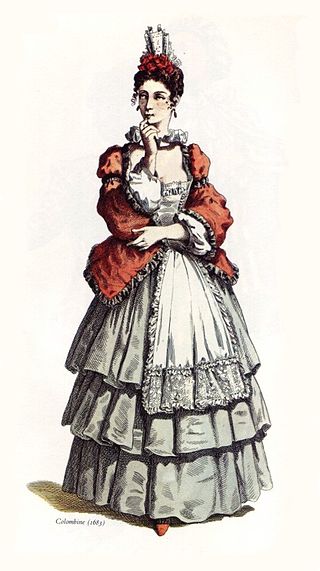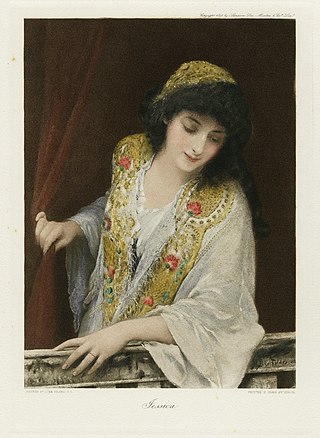Related Research Articles

Columbine is a stock character in the commedia dell'arte. She is Harlequin's mistress, a comic servant playing the tricky slave type, and wife of Pierrot. Rudlin and Crick use the Italian spelling Colombina in Commedia dell'Arte: A Handbook for Troupes.

Measure for Measure is a play by William Shakespeare, believed to have been written in 1603 or 1604 and first performed in 1604, according to available records. It was published in the First Folio of 1623.

Cross-dressing and drag in film and television has followed a long history of cross-dressing and drag on the English stage, and made its appearance in the early days of the silent films. Charlie Chaplin and Stan Laurel brought the tradition from the English music halls when they came to the United States with Fred Karno's comedy troupe in 1910. Both Chaplin and Laurel occasionally dressed as women in their films. Even the beefy American actor Wallace Beery appeared in a series of silent films as a Swedish woman. The Three Stooges, especially Curly, sometimes appeared in drag in their short films. The tradition has continued for many years, usually played for laughs. Only in recent decades have there been dramatic films which included cross-dressing, possibly because of strict censorship of American films until the mid-1960s. One early exception was Alfred Hitchcock's thriller Murder!, where the murderer is a transvestite who wears particularly frilly dresses and petticoats. Cross-gender acting, on the other hand, refers to actors or actresses portraying a character of the opposite gender.

The White Devil is a tragedy by English playwright John Webster. According to Webster's own preface to the 1612 Quarto Edition, "To the Reader", the play's first performance in that year was a notorious failure; he complained that the play was acted in the dead of winter before an unreceptive audience. The play's complexity, sophistication, and satire made it a poor fit with the repertory of Queen Anne's Men at the Red Bull Theatre, where it was first performed. It was successfully revived in 1630 by Queen Henrietta's Men at the Cockpit Theatre and published again in 1631.
Love Tricks, or The School of Complement is a Caroline stage play by James Shirley, his earliest known work.

Westward Ho is an early Jacobean-era stage play, a satire and city comedy by Thomas Dekker and John Webster that was first performed circa 1604. It had an unusual impact in that it inspired Ben Jonson, George Chapman and John Marston to respond to it by writing Eastward Ho, the famously controversial 1605 play that landed Jonson and Chapman in jail.
Northward Ho is an early Jacobean era stage play, a satire and city comedy written by Thomas Dekker and John Webster, and first published in 1607. Northward Ho was a response to Eastward Ho (1605) by Ben Jonson, George Chapman, and John Marston, which in its turn was a response to Westward Ho, an earlier play by Dekker and Webster. Taken together, the three dramas form a trilogy of "directional plays" that show the state of satirical and social drama in the first decade of the 17th century.
Women Pleased is a late Jacobean era stage play, a tragicomedy by John Fletcher that was originally published in the first Beaumont and Fletcher folio of 1647.
The Widow's Tears is an early Jacobean play, a comedy written by George Chapman. It is often considered the last of Chapman's comedies, and sometimes his most problematic, "the most provocative and the most paradoxical of any of his dramatic works."

The Devil's Charter is an early Jacobean era stage play, a tragedy written by Barnabe Barnes. The play recounts the story of Pope Alexander VI.

Monsier D'Olive is an early Jacobean era stage play, a comedy written by George Chapman.
The City Nightcap, or Crede Quod Habes, et Habes is a Jacobean era stage play, a tragicomedy written by Robert Davenport. It is one of only three dramatic works by Davenport that survive.
The Antiquary is a Caroline era stage play, a comedy written by Shackerley Marmion. It was acted in the 1634–36 period by Queen Henrietta's Men at the Cockpit Theatre, and first published in 1641. The Antiquary has been succinctly described as "Marmion's best play."
A Fine Companion is a Caroline era stage play, a comedy written by Shackerley Marmion that was first printed in 1633. It is one of only three surviving plays by Marmion.

The Feign'd Curtizans, or, A Nights Intrigue is a 1679 comedic stage play by the English author Aphra Behn. Behn dedicated the play, originally performed at the Dorset Garden Theatre in London, to the well-known actress and mistress of King Charles II, Nell Gwyn.
Mary, Lady Slingsby, born Aldridge, was an English actress. After a marriage lasting 1670 to 1680 to John Lee, an actor, during which she was on the stage as Mrs. Lee, she was widowed. She then married Sir Charles Slingsby, 2nd Baronet, a nephew of Sir Robert Slingsby, and performed as Lady Slingsby. Theatre historians have pointed out the difficulty in identifying her roles in the period when Elinor Leigh, wife of Anthony Leigh, was performing as Mrs. Leigh, because the homophones "Lee" and "Leigh" were not consistently spelled at the time.

A Woman is a Weathercock is a comedy by the English actor and dramatist Nathan Field, first performed c1609/1610 by the Children of the Queen's Revels at the Whitefriars indoor playhouse in London. It was the first play written by Field, who was aged around 22 at the time and for nearly a decade previously had been the star player of the company of boy actors.

The Wise Woman of Hoxton is a city comedy by the early modern English playwright Thomas Heywood. It was published under the title The Wise-Woman of Hogsdon in 1638, though it was probably first performed c. 1604 by the Queen's Men company, either at The Curtain or perhaps The Red Bull. The play is set in Hoxton, an area that at the time was outside the boundaries of the city of London and notorious for its entertainments and recreations. The Victorian critic F. G. Fleay suggested that Heywood, who was also an actor, originally played the part of Sencer. It has often been compared with Ben Jonson's comic masterpiece The Alchemist (1610)—the poet T. S. Eliot, for example, argued that with this play Heywood "succeeds with something not too far below Jonson to be comparable to that master's work".

Jessica is the daughter of Shylock, a Jewish moneylender, in William Shakespeare's The Merchant of Venice. In the play, she elopes with Lorenzo, a penniless Christian, and a chest of her father's money, eventually ending up in Portia and Bassanio's household. In the play's dramatic structure, Jessica is a minor but pivotal role. Her actions motivate Shylock's vengeful insistence on his "pound of flesh" from Antonio; her relationships with Lorenzo and Shylock serve as a mirror and contrast to Portia's with Bassanio and with her father; her conversion to Christianity is the end of Shylock's line's adherence to the Jewish faith.
References
- ↑ Terence P. Logan and Denzell S. Smith, eds., The New Intellectuals: A Survey and Bibliography of Recent Studies in English Renaissance Drama. Lincoln, NE, University of Nebraska Press, 1977; p. 149.
- ↑ E. K. Chambers, The Elizabethan Stage. 4 Volumes, Oxford, Clarendon Press, 1923; Vol. 3, p. 256.
- ↑ Logan and Smith, p. 146.
- ↑ Felix Emmanuel Schelling, Elizabeth Drama 1558–1642. 2 Volumes, Boston, Houghton Mifflin, 1908; Vol. 1, p. 463.
- ↑ Michael Shapiro, Gender Play on the Shakespearean Stage: Boy Heroines and Female Parts. Ann Arbor, MI, University of Michigan Press, 1994; pp. 136–7.
- ↑ Charles Mills Gayley and Alwin Thaler, Representative English Comedies, Vol. 2. New York, Macmillan, 1913; p. liii.